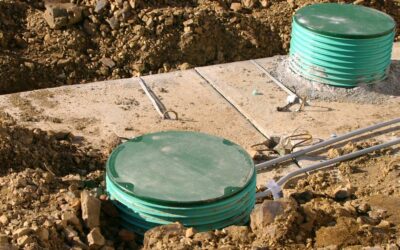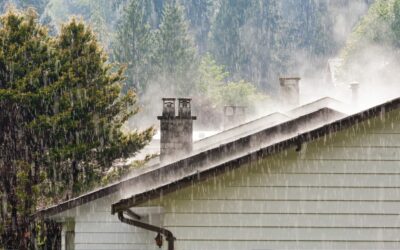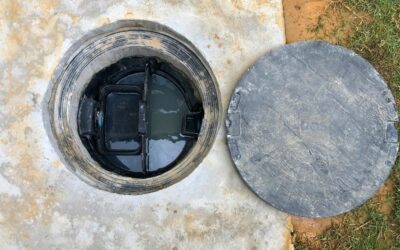Discovering your septic tank is overflowing can trigger an immediate sense of panic, but understanding the common cause and the why behind it and knowing what to do can dramatically ease your concerns. Most homeowners face this issue due to a few common causes: excess water usage, blocked drain lines, or lack of regular maintenance.
Before diving deeper into how to manage an overflowing septic tank, recognize the telltale signs: bad smells around your property, water pooling in your yard, or backups in your drains. If these issues arise, the immediate action step is to minimize water usage in your home and contact a professional to assess the situation.
4-Step Guide for Fixing Septic Tank Overflow:
- Stop using water in your home to prevent additional overflow.
- Identify signs like foul odors, slow drains, or unusually green grass over the drain field.
- Seek professional help from a trusted service like Blackstone Septic Service for an accurate diagnosis and solution.
- Practice regular maintenance, limit water use, dispose of waste properly, install alarms and filters, address drain field issues, plan for emergencies, and seek professional help to prevent septic tank overflow.
By addressing “Why is my Septic Tank Overflowing?”, you can prevent further damage to your house, property and septic system, potentially saving you from extensive repairs or replacements down the line.
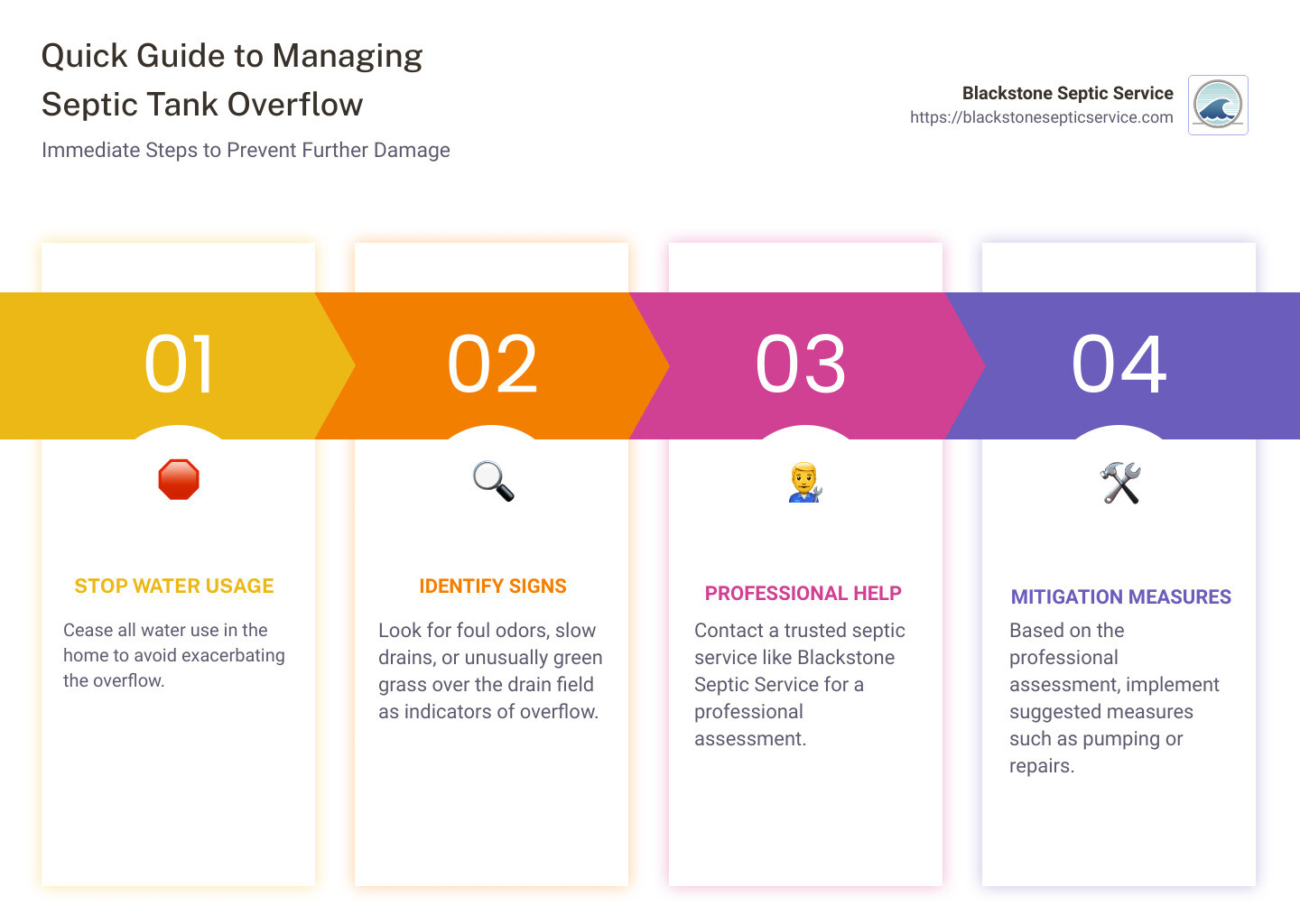
Table of Contents
Identify the Cause of Septic Tank Overflows
When you’re facing an overflowing septic tank, it’s like being a detective on a case titled “Why is my septic tank overflowing?” You need to look for clues and understand possible causes beyond the usual suspects to solve the problem effectively. Let’s dive into the common causes that could lead to this messy situation.
Heavy Rainfall
Imagine your septic system as a sponge. Just like a sponge can only hold so much water before it starts leaking, your septic system has its limits too. During heavy rainfall, the ground around your septic tank and drain field can become saturated, leaving no room for the additional water. This can cause the system to back up, leading to overflow.
Rapid Snowmelt
Similar to heavy rainfall, rapid snowmelt can also saturate the ground quickly. If you live in an area that experiences significant snowfall, the melting process in spring can contribute to septic system overflow. The sudden influx of water can overwhelm the system, causing it to fail.
Flooding
Flooding is the heavy hitter when it comes to septic system problems. It can introduce a large volume of water into your system in a short amount of time, leading to immediate overflow problems. Additionally, flooding can damage components of your septic system, compounding the problem.
Non-degradable Items
Flushed items that don’t break down can clog your septic system. Common culprits include wipes, feminine hygiene products, and even certain types of toilet paper. These items can block pipes and prevent the system from functioning correctly, causing an overflow.
Excessive Water Use
Your septic system is designed to handle a specific amount of water. If you exceed this normal amount, whether due to a large number of guests or simply overuse, you can push or pump your septic system beyond its limits. The extra water can cause the tank to overflow, especially if it hasn’t been pumped recently.
Clogged Drain Lines
Drain lines can become clogged with roots from nearby vegetation or from the buildup of non-degradable items. When drain pipes from these lines are blocked, wastewater has nowhere to go and can cause the tank to back up and overflow.
Malfunctioning Drain Field
The drain field is the point where the final treatment and dispersal of effluent take place. If this area is not functioning properly, due to compacted soil or saturation, it can’t absorb wastewater. This results in a backup and potential overflow of the septic tank.
To Wrap Up
Identifying the cause of your septic tank’s overflow is the first step in solving the problem. Whether it’s due to environmental factors like heavy rainfall and flooding, or human factors like excessive water use and flushing non-degradable items, understanding the source of the issue is crucial. Once you’ve pinpointed the cause, you can take appropriate action to fix the problem and prevent future septic tank overflows.
Regular maintenance and being mindful of what goes into your septic system can go a long way in preventing these issues. If you’re unsure about the cause or how to address it, don’t hesitate to reach out to professionals like Blackstone Septic Service for help.
Immediate Actions to Take
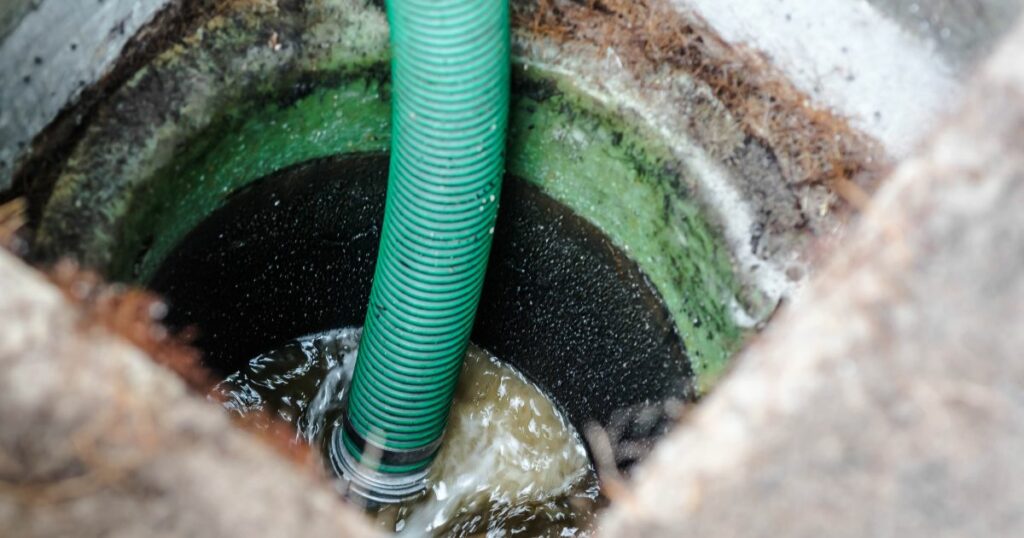
When you’re dealing with an overflowing septic tank, time is of the essence. Here’s what you need to do right away to mitigate the problem and prevent further damage.
Reduce Water Consumption
The more water you use, the more stress you put on your already struggling septic system. Here’s how to cut down:
- Stop using the dishwasher and washing machine until the issue is resolved.
- Take shorter showers and avoid baths.
- Turn off the faucet when brushing your teeth or washing dishes by hand.
Reducing water usage helps prevent additional overflow and gives your septic system a chance to recover.
Inspect Septic System
A quick inspection can provide clues about what’s wrong. Here’s what to look for:
- Pools of Water: If you see standing water around your drain field, it’s a telltale sign of overflow.
- Foul Odors: An overflowing tank often smells bad. If there’s a strong sewage odor around your property, it’s time to act.
- Slow Drains: If your sinks and toilets are draining slowly or not at all, your septic system could be the culprit.
While inspecting, don’t attempt to open the septic tank yourself. This can be dangerous due to toxic bacteria and gases.
Professional Assessment
After doing what you can to mitigate the problem, it’s crucial to get a professional assessment. Experts like Blackstone Septic Service can provide a thorough inspection to identify the root cause of the overflow. They can check for:
- Clogs or Blockages: They’ll inspect the pipes and the tank for any signs of blockage.
- Drain Field Issues: They can assess if the drain field is saturated and unable to properly filter wastewater.
- Tank Capacity: They’ll check if the tank is full or if there’s a more serious issue at play.
Professionals have the tools and knowledge to safely assess and address septic system problems. Attempting to fix the issue on your own without the proper expertise can lead to more significant damage or even health hazards.
The key to handling an overflowing septic tank is quick action and professional help. Reducing your water consumption and inspecting your system can provide temporary relief, but a professional assessment is crucial for a long-term solution. Don’t wait until the problem worsens. Contacting a trusted service like Blackstone Septic Service can save you time, money, and a lot of headaches down the road.
Solutions to Common Problems
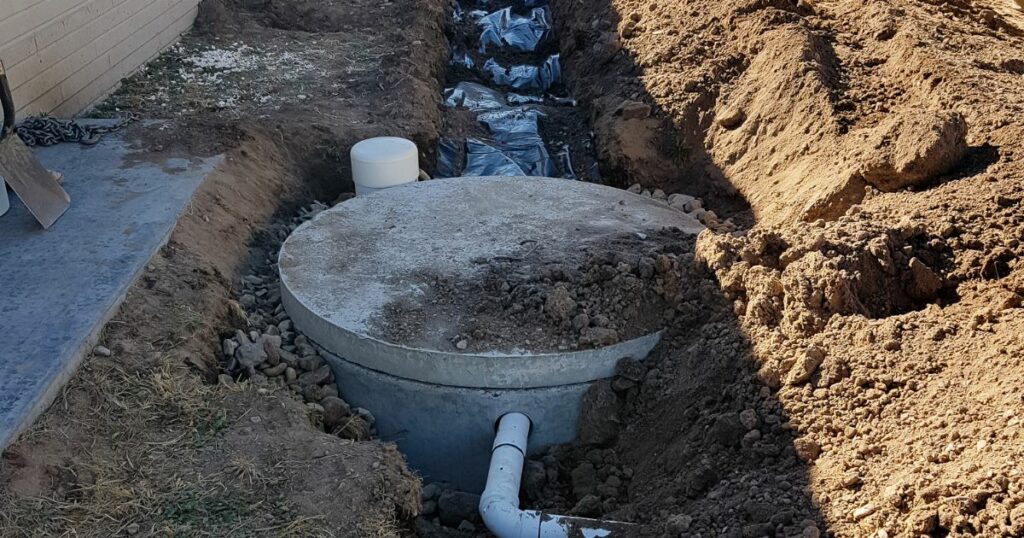
Pumping the Septic Tank
Regular maintenance, including yearly inspections and pumping every 2-3 years, is crucial to prevent your septic tank from overflowing. Over time, sludge accumulates at the water level at the bottom of your tank. If not removed, it can lead to backups and overflows. A well-maintained tank is a happy tank!
Addressing Clogged Drain Lines
Clogged drain lines, often due to tree roots or non-biodegradable materials, can cause significant issues. To prevent this, be mindful of planting trees away from your drain field and avoid flushing anything other than normal human waste and toilet paper. If clogs happen, professional removal may be necessary.
Restoring Bacterial Balance
Your septic system relies on bacteria to break down waste. Avoid harsh chemicals that can kill these beneficial bacteria. Instead, use bacterial additives to maintain a healthy balance in your tank. This simple step can dramatically improve your system’s efficiency and prevent overflows.
Repairing or Replacing Components
Sometimes, components like the drain field or pipes may get damaged or wear out. If you’re facing persistent issues despite regular maintenance, it might be time for repairs or replacements. Early intervention can prevent more costly fixes down the line.
Preventative Measures
The key to a healthy septic system is prevention. Reduce water usage to avoid overloading your system, dispose of waste properly (no non-biodegradable materials down the drain!), and schedule regular inspections. These steps can extend the life of your septic system and prevent unpleasant surprises.
By addressing these common issues, you can keep your septic system running smoothly for years to come. And remember, when in doubt, reach out to Blackstone Septic Service for expert advice and service. They’re here to help you with everything from routine maintenance to emergency repairs, ensuring your septic system stays healthy and efficient.
Conclusion
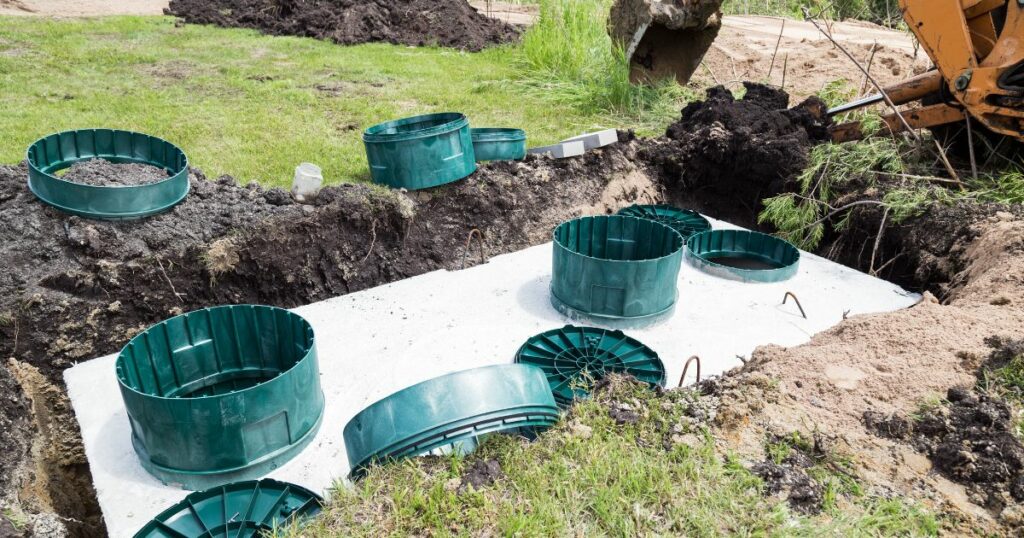
Maintaining a healthy septic system is crucial for preventing overflows and ensuring the longevity of your system. Prevention is always better than cure. A regular maintenance schedule is not just a recommendation; it’s a necessity.
Maintenance Schedule
To keep your septic system running smoothly, we recommend having it inspected and pumped every 2-3 years. However, this can vary depending on the size of your tank, the number of people in your household, and your overall water usage. Keeping a log of inspections, pumpings, and any repairs is also a good practice. This history can help you predict when your system might need attention and prevent emergencies before they happen.
Blackstone Septic Service
Contact us today at Blackstone Septic Service, we understand the importance of a well-maintained septic system. Our team of experts is dedicated to providing you with the best service to ensure your system is functioning correctly and efficiently. Whether you need routine maintenance, emergency repairs, or just some friendly advice, we’re here to help.
Our services are designed to address all aspects of septic system care, from pumping and cleaning to repairs and inspections. We pride ourselves on our prompt, reliable, and customer-centric approach. With over 75 years of combined experience, our family-owned company has the knowledge and expertise to tackle any septic challenge.
Don’t wait for an overflow to happen. Regular maintenance can save you from the hassle and expense of emergency repairs. Contact us today to schedule your next service and keep your septic system in top condition. Your satisfaction is our priority, and we’re committed to keeping your septic system running smoothly.
Frequently Asked Questions about Septic Tanks

Overflowing septic tanks can be a real headache for homeowners. Let’s clear up some common questions you might have about why this happens and how to prevent it.
Why is my septic tank overflowing after being pumped?
If your septic tank is overflowing soon after being pumped, there could be a few reasons. First, check if there’s excessive water usage in your home. Everything that goes down your drains ends up in the septic tank. Too much water can fill the tank faster than it can be processed.
Another reason could be a blockage or damage in the drain field. The drain field is where the liquid from the septic tank flows into the soil. If this area is not working correctly, water can’t filter away, causing the tank to fill up and overflow.
Lastly, it could be due to the return of solids to the tank. This happens when the tank is pumped, but the blockage remains in the system, preventing proper flow.
Can heavy rain cause my septic tank to overflow?
Yes, heavy rain can contribute to your septic tank overflowing. When the ground is saturated, the drain field can’t absorb water efficiently. This means that water can’t leave the tank as it should, leading to potential overflow. It’s crucial to monitor your septic system during and after significant rainfall and to reduce water usage during these times to prevent overflow.
How often should I pump my septic tank?
Most septic tanks need to be pumped every three to five years. However, this can vary based on the size of your tank, the number of people living in your home, and how much water you use. Regular inspections by a professional can help determine the best pumping schedule for your specific system. Keeping up with this schedule is vital to prevent sludge and scum from building up to levels that could cause your system to malfunction.
An overflowing septic tank is more than just an inconvenience; it can be a health hazard and cause significant damage to your property. If you’re facing issues with your septic system, don’t hesitate to reach out to professionals like Blackstone Septic Service. They can provide the expertise and solutions needed to keep your system functioning correctly.
Our Content
Our experienced septic tank specialists have carefully reviewed and edited all of the content to ensure that it meets our high standards for quality and accuracy. At Blackstone Septic Service, our mission is to provide unparalleled expertise and service excellence in the realm of septic system care. With a dedicated team of professionals committed to delivering top-tier septic systems and solutions, we specialize in comprehensive services such as routine maintenance of clogged drains, septic tank pumping, septic cleaning, and even new septic system installations. Blackstone Septic Service is a family-owned company with highly trained technicians, with over 75 years of experience in septic tanks.

